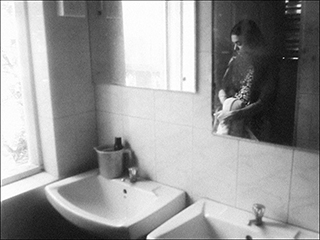A Night of Knowing Nothing
- INDIA, FRANCE / 2021 / Hindi, Bengali / B&W /DCP / 100 min
 Director, Script: Payal Kapadia
Director, Script: Payal Kapadia
Script: Himanshu Prajapati
Photography, Editing: Ranabir Das
Sound: Moinak Bose, Romain Ozanne
Narrator: Bhumisuta Das
Producers: Thomas Hakim, Julien Graff, Ranabir Das
World Sales: Square Eyes
A letter by a film student, L, addressed to her lover, is discovered in the corner of a student dorm. This fictional narrative, delivered via a woman’s recitation, reveals the caste system as the source of the tragic end to L’s romantic relationship, and ties in with actual anti-government protests that occurred in 2016 and the persecution of the student movement by a far-right political party and Hindu supremacists. Fiction and reality lose their distinction as young people’s daily lives, L’s tragic love story, and the tense struggle represented by the altercations between street protesters and police all meld in monochrome. Capturing the passion and conviction of the protesters as well as a record of the determination of the filmmakers, the film provides a snapshot of the current state of India. (YM)
[Director’s Statement] We began shooting in 2017, starting to document life around us and through that, we started documenting our friends. We shot extensively—parties, birthdays, long afternoon naps. Not always sure of what we were doing but amongst people we knew well, shooting was intimate and casual. Time passed and there was still no sense of what the film would be. As we began to put sequences together, friends from other universities gave us footage shot from a pressing need to document, but with a similarly uncertain purpose. We found more footage—rushes borrowed from friends, old family archives and viral videos off the internet. Our collected images became a growing archive of memories of the time we had lived and witnessed. Soon even the footage we had shot began to feel as if it were “found,” perhaps as a time capsule of our own past.
This film is our homage to the public university system in India. For centuries, certain sections of Indian society were denied access to education. The public university system was designed to correct these historical wrongs. Although it may not have always succeeded in doing so as caste and other discriminations still exist structurally, it still potentially provides space for true freedom, both physical and intellectual, where nothing is sacrosanct and everything needs to be questioned. This is the freedom to which we must aspire for future generations, so that young people with access may free themselves from the society that binds them. The film is a long dream, told from the point of view of a gentle, feminine voice.
 Payal Kapadia
Payal KapadiaA Mumbai-based filmmaker and artist, she studied Film Direction at the Film & Television Institute of India. Her short films Afternoon Clouds (2017) and And What Is the Summer Saying (2018, YIDFF 2019) premiered respectively at the Cinéfondation and the Berlinale. She is a Berlinale Talents alumna and participated in 2019 at the Résidence du Festival de Cannes. This, her first feature length film, showed at Director’s Fortnight Cannes 2021, winning the Golden Eye Prize for Best Documentary. All We Imagine as Light, which received support from CICLIC, Hubert Bals Fund & PJLF Arts Fund is currently in development.
